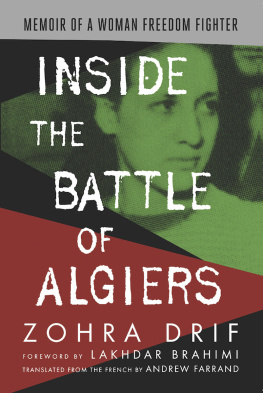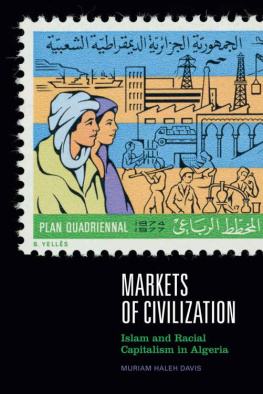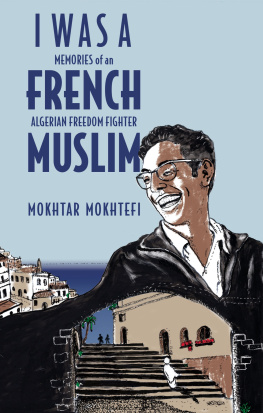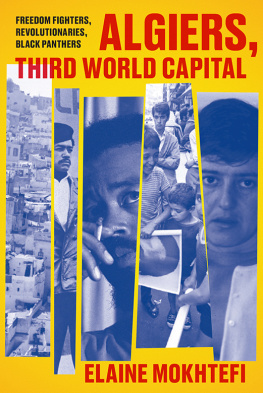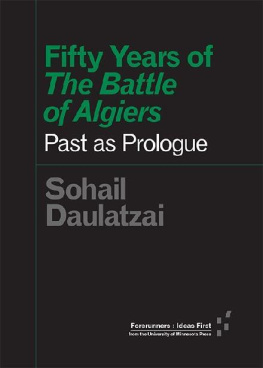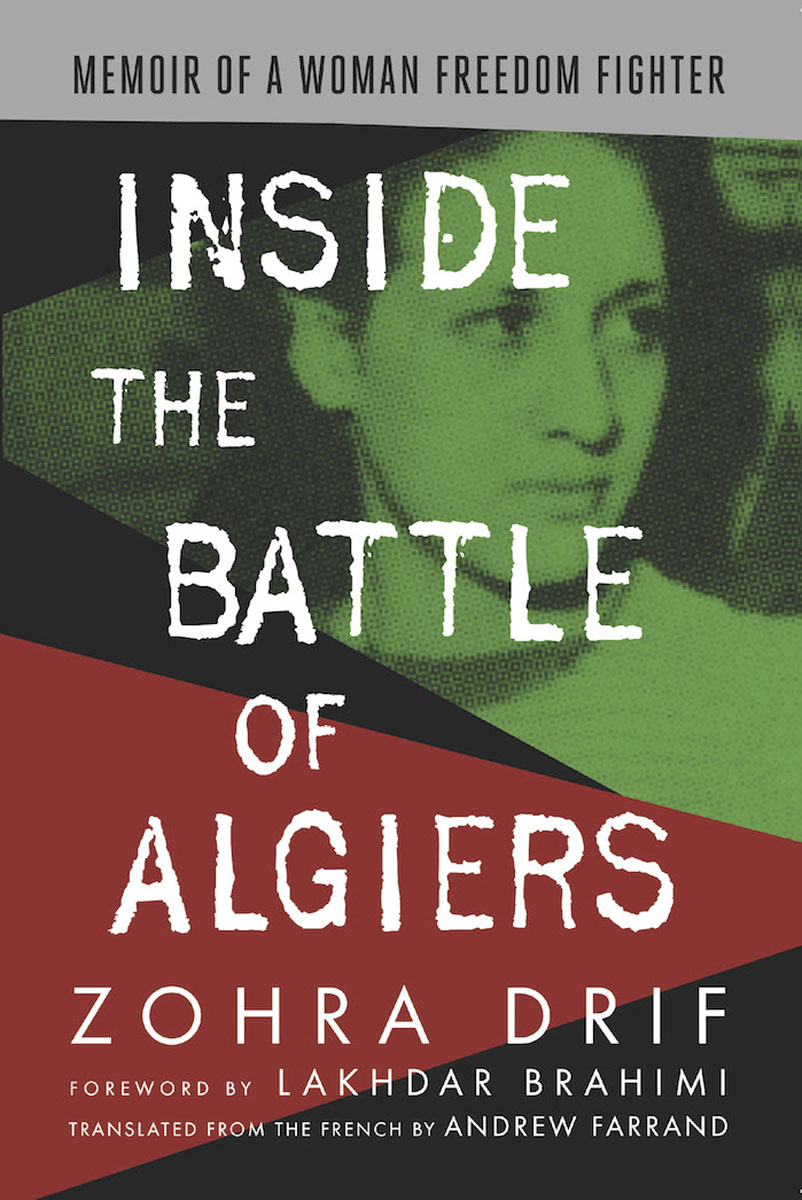
Additional Praise for Inside the Battle of Algiers
Viewers of The Battle of Algiers have always had the option of closing their eyes during the disturbing scenes of torture and other violence portrayed in the classic film focused on Algerias War of Independence. Drifs compelling memoir, however, forces the reader to confront the daily, grinding brutality of Frances settler colonial project, and the price paid by the men, women and children who participated in myriad ways in the struggle to defeat it
Filled with rich detail of the socioeconomic, religious and political context of the period, Drifs account can serve as an engaging and accessible introduction to Algeria, settler colonialism, and national liberation wars for students, just as its amazing first-hand account of the role of one of the FLNs most important female fighters provides new insights and historical material for specialists.
Laurie Brand
Wright Professor of International Relations, Univ. of Southern California
The English translation of Zohra Drifs memoirs is a publishing event. It makes available to a wider audience the life and times of an Algerian woman who was both actor in, and witness to, one of the 20th centurys most dramatic independence struggles. As importantly, her autobiography reveals the lived daily realities of what she calls the Algerian awakening. That political as well as social and cultural prise de conscience took place not only in colonial schools, military service, or the press but also in unexplored places, such as weekly female hammam sessions. There, in the only domain where women enjoyed unquestioned, inviolable sovereignty, Algerian resistance and identity were nurtured by heroic tales from distant timesand after November 1954 by the latest news about the moudjahidine (anti-colonial combatants.)
Julia Clancy-Smith
Dept. of History, Univ. of Arizona
Who is Zohra Drif? An Algerian heroine who fought the French, then spent five years in their prisons, she has not been recognized like her two co-fighters Djamila Bouhired and Djamila Boupacha. Until now. With the publication of her autobiography, Inside the Battle of Algiers, we have a narrative that is engrossing and also provides a new, fresh look at a critical moment in Algerian history. One of the critical but occluded players in the Battle of Algiers, she will now be known to the world through her own eloquent words. Essential reading.
miriam cooke
author, Dancing in Damascus: Creativity, Resilience and the Syrian Revolution
Zohra Drifs book of memoirs is a precious contribution to the knowledge of the Algerian War of Independence. It shows the decisive role of women in the war. [It] also sheds light on the miracle of culture in the resistance and the unique, historic ascent of a people that was able to escape from annihilation by finding deep within itself the resources of its values of justice and human dignity, values that have structured its faith and ethics throughout the terrible ordeal of colonial oppression, as well as on the path to political and moral victory.
The Zohra Drifs legacy is two-fold: not only was she an authentic freedom fighter during the war, but she now completes her work by leaving her testimony for her young compatriots, thirsty for truth, and eager to find the trail of the struggle to liberate themselves from the scourges of today.
Amin Khan
author, Nous autres, Elments pour un manifeste de lAlgrie heureuse
Charting the Battle of Algiers, a critical chapter in the history of the Algerian War in which she came to play a key role as an urban guerrilla, Zohra Drif has written a fascinating, detailed memoir that grants her readers an awareness of the oppression that weighed upon the colonized during the French colonial era and an understanding of the difficult struggle that led to Algerian independence. As she relates historical events through her interpretive lens, Drif insists upon the collective dimension of the war experience and womens role in it.
Mildred Mortimer
Univ. of Colorado
Zohra Drif has given us a powerful, firsthand account of the amazingly courageous role played by women in Algerias eight-year struggle for independence from France. A major player, Zohra hid out in the Casbahs labyrinth during the 1957 Battle of Algiers. There, she served as a courier between myriad safe houses, organizer of other partisans and even executor of a European caf bombing. Zohra unveils her raw emotions when faced with fears of capture and torture and finally betrayal from within nationalist ranks.
From start to finish, it reads like a thriller.
David Ottaway,
formerly of The Washington Post:
Zohra Drif, a living legend of the Algerian freedom movement, was a moujahida for a country then held in vicious bondage by French colonialism. Here she tells the story of her journey to help free her country, a story which becomes of course the story of the Algerian war of independence. This is one of the most engaging memoirs to come out of the period of decolonization.
Vijay Prashad
author, The Darker Nations: A Peoples History of the Third World
When the French edition of this book appeared in 2013, I rushed to get it and read it. Although I knew the broad outlines of the story from my early research in Algiers, my interest was especially piqued because of the author, Zohra Drif. [She] has written a remarkable memoir, filled with fascinating detail about her personal story, the nature of Algerian society on the eve of independence, and the tight-knit group of militants, including herself, who organized the armed wing of the nationalist movement in the Casbah of Algiers in 1956-57. She writes with chilling honesty about her belief that it became necessary to carry the armed conflict to the French civilians in Algiers, and her own role, at age 22, in planting the bomb that exploded at the Milk Bar.
Thanks to Andrew Farrands excellent translation, English speakers can now also benefit from this vivid memoir and history.
William B. Quandt
Professor Emeritus of Political Science, Univ. of Virginia
Of the many hundreds of books written about the Algerian war of independence, none matches Zohra Drifs Inside the Battle of Algiers for capturing the white-hot fervor of a very young Muslim woman student of impeccable family background caught up in her countrymens savage war of national liberation from France
Hers is a gripping tale, at times feminist as much as nationalist, of a conflict pitting militant anti-colonialist Muslims against a major Western power in which (refreshingly) radical Islam played no appreciable role.
Jonathan Randal
formerly of The Washington Post; author, The Tragedy of Lebanon
This marvelous book is several important things in one. It is the story, recounted with great candor and superbly written, of a remarkable Algerian womans journey It is an extremely detailed account of the famous Battle of Algiers and of her own role in it, and one which greatly enriches specialist historians understanding of this dramatic event. It is, in addition, a very moving tribute to the women of Algeria, which not only describes the indispensable role they performed in preserving Muslim Algerians identity, traditions and collective self-respect throughout the period of colonial domination but equally the vital role they played, and the extraordinary courage, tenacity and resourcefulness they brought to this, in the war of liberation itself.
Hugh Roberts,
Edward Keller Professor of North African and Middle Eastern History, Tufts Univ.
Next page
